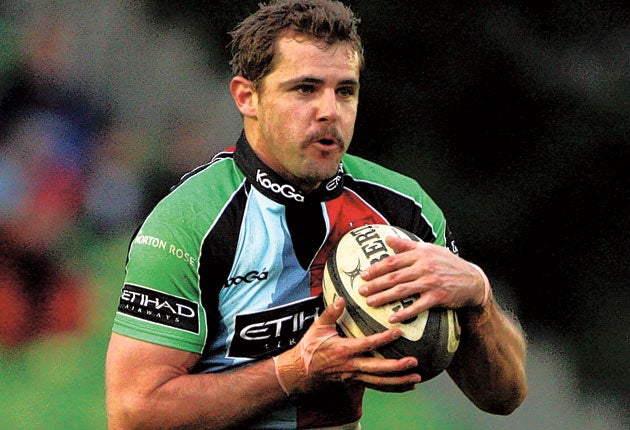Whistle-blower will be needed if the salary cap doesn't fit
Premier Rugby harbour concerns over potential for clubs to hide extra payments

Premiership officials believe it will take a player to turn "whistle-blower" before any English club is charged with breaching the salary cap, despite confirming that a number of top-flight sides have been asked to "clarify" items in their accounts from last season. Financial penalties or relegation through the deduction of points are the sanctions faced by a club flouting the £4 million cap, although a stripping of past titles as has happened to Melbourne Storm in Australian rugby league has not been considered.
Reports suggest it was a former Melbourne Storm employee who exposed a five-year scam of unauthorised player payments at the NRL club. The Guinness Premiership operates a similar system to the NRL's of annual auditing. But the clubs' umbrella body Premier Rugby (PRL) acknowledge the weakness of the system is that players' bank records and the books of any company other than the club are beyond the scope of their investigations. Tales are rife of players and their families being paid through secondary companies but finding proof is near impossible.
PRL's rugby manager, Phil Winstanley, who sits on the five-man wage-cap subcommittee, admitted "there has always been innuendo and comment" and said that the Wasps owner, Steve Hayes, would not be rebuked for accusing one unnamed club of flouting the regulations. "I'm not sure Steve or anybody is saying that a club has been caught beating the cap," he said. "All 12 clubs will have been asked for further information. Some of them we may have been satisfied with, others may be ongoing."
Winstanley said the process relating to the 2008-09 season would be finished within "four to five weeks" and added: "If we had it [the evidence], we'd take the action. You can operate outside the regulations but there comes a point when somebody decides that's inappropriate and there's a whistle-blower. It could be a disgruntled player, it could be someone else within the club who is disgruntled. If clubs have the evidence, they only need to pick up the phone."
The cap covers any payment relating to a senior squad player or his family – including image rights, national insurance, agents' fees, win or end-of-season bonuses and player-coach salaries. Academy players come under a £200,000 limit. The cap year runs to 30 June, and clubs make returns by the end of September together with a projection of the next year's spending and copies of player contracts. Premier Rugby's auditors, Saffery Champness, work on them between November and January, after which requests for clarification are made.
No charges have been brought since the cap was introduced in 1999. The regulations were tightened two years ago but a new position of PRL salary-cap manager has been unfilled since it was created last summer. One former club employee told The Independent on Sunday: "Many of the directors of these rugby clubs have contacts elsewhere and they have companies elsewhere. If a player was paid extra money through another company or a sponsor, there's no way on earth anyone could check it. The payments are more likely to be for image rights than PAYE because they have a different tax status and it's easier to manage."
Anecdotes range from the provision of free food and cars to players living rent-free in houses paid for by interest-free loans from club owners and receiving the profit when the property was sold. One club is said to have made image rights payments to teenaged academy players. A player being paid through another company could be saving up to 40 per cent in PAYE compared to corporation tax.
Premier Rugby expect every club to receive an extra £750,000 in central funding next season, including the new EPSN TV deal. Some clubs will see it as a lifeline in hard times. Hayes' Wasps are said to have lost £2m last season and in recent years have consistently shed big earners, from Lawrence Dallaglio, Matt Dawson, Rob Howley and Josh Lewsey retiring to James Haskell, Tom Palmer, Paul Sackey and Danny Cipriani moving elsewhere. Tom Rees, the captain, had to forego a promised pay rise. Other clubs such as Saracens and Leicester who have wealthy owners or the asset of owning their own stadium are more at liberty to boost their playing squad. Harlequins, with a 38-man squad, signed All Black fly-half Nick Evans on £320,000 a year and Worcester, with 42 players, can afford a combined £550,000 in Chris Latham and Rico Gear. An England international is likely to be on a basic £200,000. But the cap prevents a club dual-registering a star such as Bryan Habana overseas as it puts a market value on the player's head here.
"We're operating in sport and people want to win things," said Winstanley. "People will always push themselves and often beyond the limits. We have got a very competitive Premiership and the salary cap is one mechanism contributing to that. People say the French clubs have more money but the English performance in the Heineken Cup in the last 10 years has been as good as, if not better than, the French. We had no semi-finalists this season but that was a blip."
Subscribe to Independent Premium to bookmark this article
Want to bookmark your favourite articles and stories to read or reference later? Start your Independent Premium subscription today.

Join our commenting forum
Join thought-provoking conversations, follow other Independent readers and see their replies